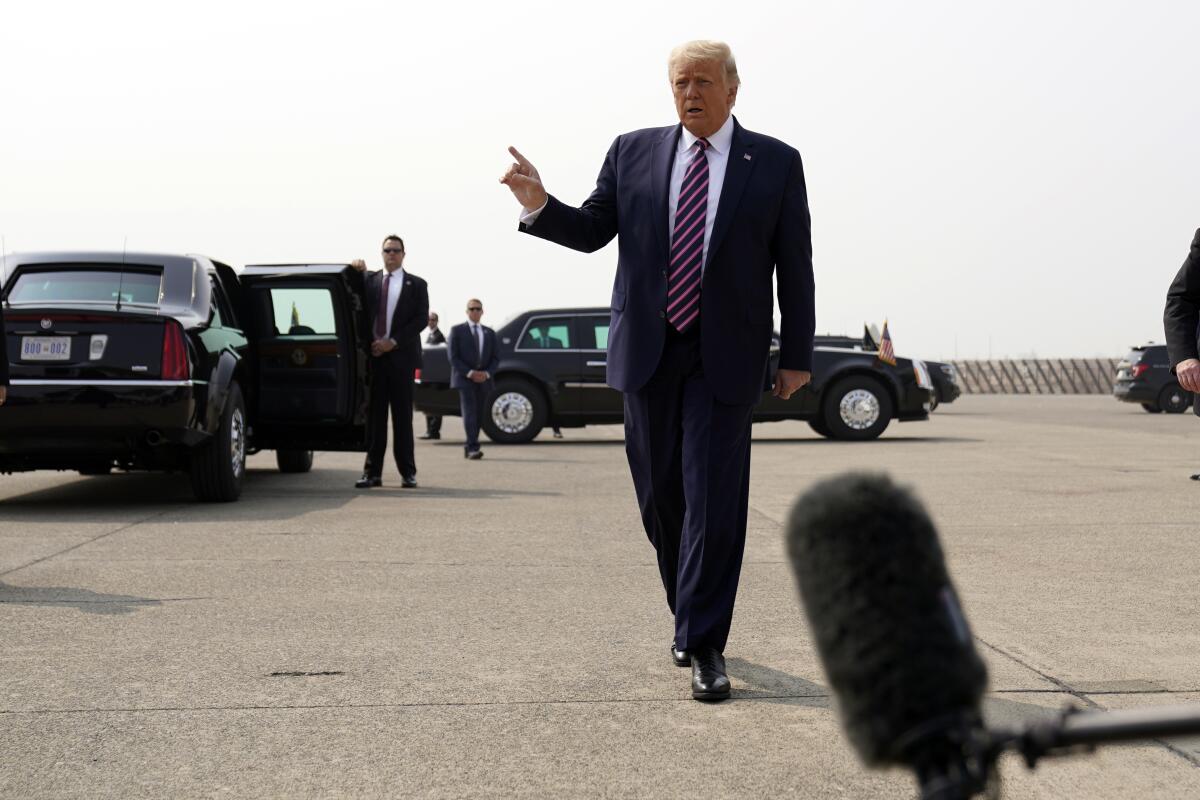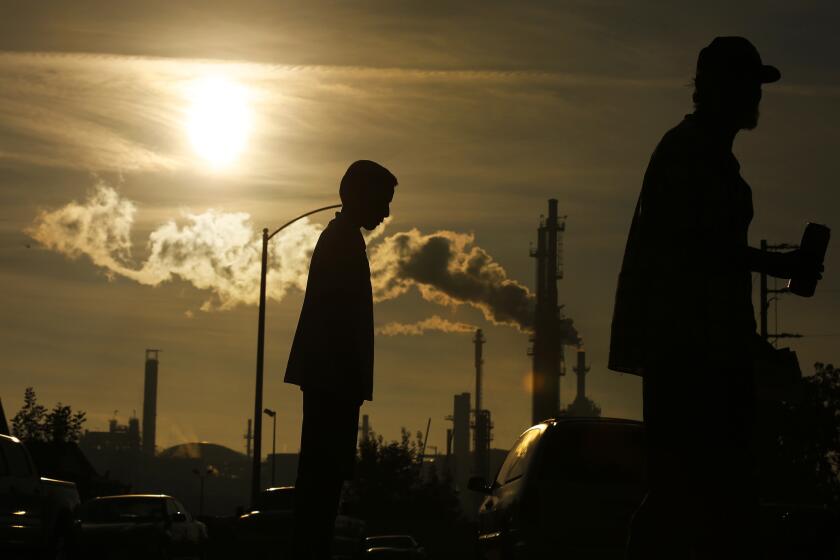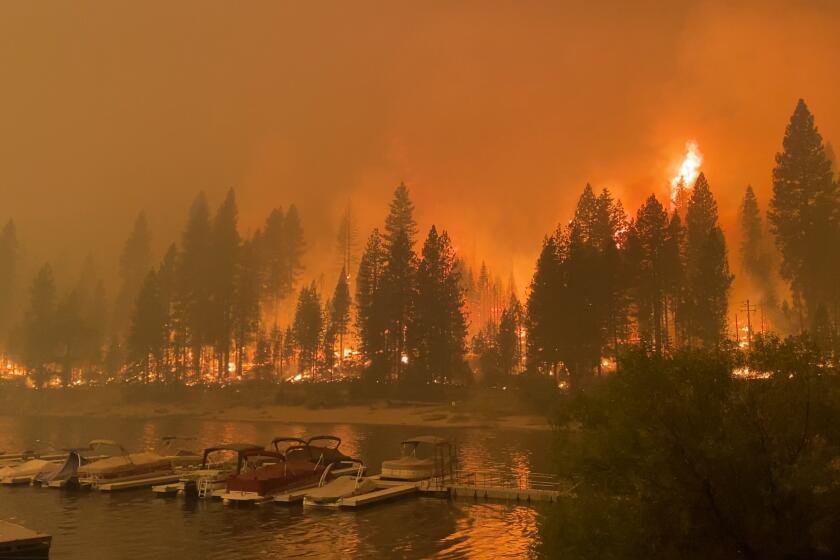In California, Trump continues to deny climate change is real: ‘It will start getting cooler’

WASHINGTON — As wildfires raging through the West force millions of voters to confront the consequences of a warming planet, the presidential race became intensely focused Monday on climate change — an issue that has been overshadowed through much of the campaign.
The realities of communities ablaze, mass evacuations and curtains of thick smoke settling over large, densely populated swaths of the Pacific coast pushed the rival candidates to detour from the battleground states and lay out starkly contrasting visions for reversing the cycle of worsening natural disaster.
Landing in California, where state officials say his unyielding efforts to undermine global action on climate have intensified the crisis, President Trump continued to express skepticism about climate science.
In a briefing with state and federal officials, Gov. Gavin Newsom told Trump: “We feel very strongly the hots are getting hotter, the dries are getting drier.”
“Something has happened to the plumbing of the world, and we come from a perspective, humbly, that we assert that the science is in, and the observed evidence is self-evident that climate change is real. Please respect the difference of opinion out here with respect to the fundamental issue of climate change,” he said.
The president said, “Absolutely.”
A few moments later, however, during a presentation by California Natural Resources Secretary Wade Crowfoot, Trump said: “It will start getting cooler, you just watch.”
When Crowfoot said that science disagreed, Trump shot back: “I don’t think science knows.”
The exchange came as Crowfoot emphasized the effect of warming by noting Death Valley has broken a world record with temperatures reaching 130 degrees. Trump raised his eyebrows and smiled, signaling he was impressed but not alarmed.
Just before Trump landed, Democratic nominee Joe Biden denounced Trump as a “climate arsonist” and laid out how different policies would be under a Biden administration.
“It shouldn’t be so bad that millions of Americans live in the shadow of an orange sky and are left asking, ‘Is doomsday here?’” said Biden, delivering remarks in a meadow outside the natural history museum near his home in Wilmington, Del.
Biden pilloried the president for his response to the fires — which has included blaming the state for doing a poor job of raking leaves in forests and threatening to withhold desperately needed federal aid — and he took aim at Trump’s broader effort to scrap federal action to curb climate change.
Trump and Biden hold radically different views on environmental policy and climate change. Here’s what voters can expect from the next president.
He accused the president of trying to stoke racist fears among suburban voters about inclusive housing policies when, Biden said, it is natural disasters caused by climate change that pose the biggest threat to suburbs.
“If we have four more years of Trump’s climate denial, how many more suburbs will burn from wildfires?” Biden said. The effects of the infernos could be felt even thousands of miles away in the mid-Atlantic region where Biden spoke, after the intense smoke drifted east in the jet stream, tinting the sky over Washington with haze.
“Donald Trump’s climate denial may not have caused these fires and record floods and record hurricanes, but if he gets a second term, these hellish events will continue to become more common, more devastating and more deadly,” Biden said.
He continued his critique in a virtual fundraiser later in the day hosted by Rep. Adam B. Schiff (D-Burbank) and entertainment mogul Haim Saban: “The West is literally on fire, and it’s still all about him.”
Biden has proposed an aggressive $2-trillion plan for climate action that has gotten little voter attention in a race dominated by concerns about the COVID-19 pandemic, protests over racial injustice, and disputes over the integrity of America’s election systems.
For his part, Trump focused Monday on forest management and the role of what he described as “exploding trees,” further exasperating scientists and state officials.
“When trees fall down after a short period of time, they become very dry — really like a matchstick ... and they can explode,” Trump said. “Also leaves. When you have dried leaves on the ground, it’s just fuel for the fires.”
“I was talking to the head of a foreign country and they said, ‘We consider ourselves a forest nation. We have trees that are far more explosive than they have in California, and we don’t have that problem.’”
Newsom, in his remarks, acknowledged that both state and federal officials have fallen short in forest management. Forestry officials have said that years of policies designed to suppress as many fires as possible have allowed fuel to accumulate in forests across the West.
The explosive Creek fire, fueled by beetle-killed trees, is a hint of the Sierra Nevada’s future unless California greatly expands prescribed burns.
But, the governor stressed, all of those problems have been intensified by drought that climate change has worsened.
Biden, in his remarks, said Trump’s hostility to climate science reflects a president who “won’t listen to the experts or treat this disaster with the urgency it demands, as any president should do during a national emergency.”
Biden is pledging to immediately move to revive and update Obama-era climate initiatives that Trump scrapped and push for a large-scale investment in public works that would reorient the economy toward green energy. Trump has characterized such measures as the agenda of the far left and out of sync with American attitudes about energy.
Polls have shown voters are increasingly concerned about global warming and in favor of the types of investments Biden promises, although the issue has never been a top priority for most voters.
California and other states are already pushing forward in the direction of more green energy, in face of fierce headwinds from the Trump administration. The state is mired in 100 lawsuits against the federal government, some of them triggered by administration efforts to block California from taking its own climate action.
The biggest and most consequential dispute is over the state’s ability to set its own vehicle emissions standards. Car and truck emissions are the single biggest contributor to climate change, and California has long been empowered to set its own rules. The state’s outsize influence over automobile sales has traditionally pushed automakers to adopt the California rules as their national standard. The Trump administration is seeking to stop California from imposing those rules, even after several automakers voluntarily agreed to embrace them.
The Trump administration has also stymied the state’s race to move its electricity grid entirely to clean energy. It eliminated an Obama-era plan to help all states move in that direction, instead embracing an energy policy focused heavily on boosting the use of coal and other fossil fuels.
One of Trump’s first moves as president was to withdraw the United States from the Paris accord on global warming, which would have held the nation to a strict timeline for reducing fossil fuels.
On landing in Sacramento, Trump was asked why he waited so long to visit California, as the fires have been raging for weeks.
“That’s a nasty question,” said the president, who noted he ultimately did approve disaster aid for the state.
“I got a call from your governor immediately. On that call, I declared it a national emergency. That’s a nasty question.”
More to Read
Get the L.A. Times Politics newsletter
Deeply reported insights into legislation, politics and policy from Sacramento, Washington and beyond. In your inbox three times per week.
You may occasionally receive promotional content from the Los Angeles Times.














